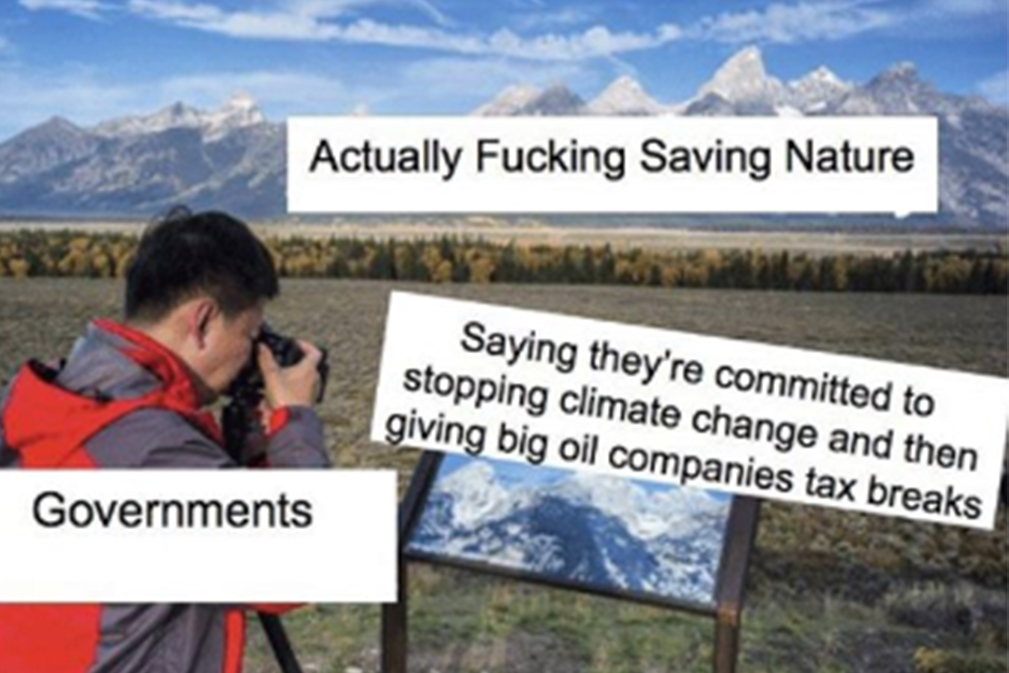
At first, it was just a joke. It might have been a LOLcat, or it might have been the first time you Rick Roll’d someone. It might’ve been only recently, when you followed one of the countless meme curation accounts on Instagram. But in your life you have seen a meme, you have laughed, and you have kept on scrolling – maybe even passing it along to a friend. It is now, however, that memes have moved beyond being Just Jokes. With a rise in culture war politics and a rapidly maturing generation born into the internet, memes have become a form of communication and education – and this year they’re tackling climate change.
Above all else, memes are a methods of communication. In their earliest forms memes were designed to tell us what we already knew, but better. They were instantly memorable for triggering a unique combination of funny and relatable and real. Movie dialogue is often a stylised version of the way we wish we spoke, and memes were always the reactions, the faces, and the messages we related to deep down in our hearts without often finding the words.
Now, memes have evolved beyond all of that. There are genres. Dictionaries. Voice memes. Short videos. Songs that are memes before they are songs again. We are in the golden age of meme as communication.
Our youngest generation, the first to live and breathe the internet, knows this in ways that those older than themselves will never be able to understand. Millennials might think they understand the internet, but there’s a difference between being born in the mud and just diving into it later.
“On social media things move very fast, and to capture people’s attention you need to be able to have it be quick and digestible,” says Violet Cully, a volunteer for the Australian Youth Climate Coalition (AYCC).
Cully, 21, told me memes were a crucial part of AYCC’s outreach operation, which aims to mobilise young Australians to campaign for a sustainable future. Sharing a message “can be a challenge if you do have a particularly complex issue,” she said.
“The challenge is working out how you can convey that really effectively.”
For Cully and others her age, climate change has always been something talked about. She helped organise an environmental group at school, and knows the real-world rewards of creating thoughtful memes. She sites direct examples of young Australians from Darwin volunteering for the AYCC on the back of a TikTok video.
“I think if you ask someone like Scott Morrison about TikTok he’d say ‘what is that?’” she says.
“They are possibly missing out on conveying their views, but I don’t know if they could get on there anyway and convey what they mean without being embarrassing.”
On TikTok, the Chinese-backed wonderApp of 2019 that is a combination of Vine and meme curation, global warming is a regular topic. Recently, teenagers and creators used the hashtag #globalwarning and filmed themselves coughing up plastic and struggling to breathe, the zombified versions of themselves living in the year 3000. Bodies covered in paint showed off beautiful landscapes on one side and a deteriorated replica on the other, with power stations and brown smog filling the horizon that nestles on their shoulders.
“Young people will listen to other younger people,” 16-year-old TikTok user Hana Martin told the BBC’s Kris Bramwell. “My friend told me off the other day for using a plastic bottle. That’s what impacts you the most, when people you know are doing things to help the environment that you aren’t doing now. That’s more effective than adults or politicians talking about it.”
Watching the physical world fall to pieces around them, the world’s youth have turned to social media. Entire meme page industries have been built on Instagram and Twitter, raking in millions of dollars for anyone who hits the right tone and the right spot in the algorithm.
Climemechange, on Instagram, calls out celebrities for wastage – like Kanye West and DJ Khaled using their private planes, embracing on the tarmac as they trade shoes. The biography for the page (“We’re literally dying!”) hits at the ironic humour so steeped in internet culture that it’s easy to forget how bizarre it is. The memes are all current and all up-to-date, and they riff off of popular culture like all memes do. When Shawn Mendez and Camilla Cabello uploaded a video of themselves overtly making out with each other, tongues literally wagging in the breeze, the account re-uploaded the footage with the words “me” and “solving climate change” over either singer. To this audience, solving climate change is like making out with someone incredibly attractive, famous, and wealthy. That would be nice.
https://www.instagram.com/p/B2WobLoHiuB/?utm_source=ig_embed&utm_campaign=dlfix
https://www.instagram.com/p/B2HVBhJnC81/?utm_source=ig_embed&utm_campaign=dlfix
stop ittttt global warming stop! now
— pussy (@LilNasX) July 5, 2019
It is not just an Australian phenomena: climate memes are the communication method of teenagers everywhere. Ellen Scott writes in the Metro of a team of teenagers haunted by ecoanxiety, making memes as a form of personal release. They spend hours a week making memes out of “necessity and passion,” with many of the Instagram accounts run by multiple people, all of whom want to raise awareness about the environment and climate issues inbetween real-world action like student-run strikes.
“Seeing that other teenagers are thinking the same things as you about climate change can show you that you’re not alone in your fears and maybe spur you into action,” says Ela, who runs an account called Sustainabiliteens.
And so the world has been crunched down into a political culture war accelerated by the internet. Gen Z, unable to vote and unheard by The Olds, are only conveying what matters using the platforms that got the issues there in the first place. Climate change, the environment, our burning planet: there is ironic humour in the death of humanity. Can you pair that with education? Probably.
Australia’s government is indeed in a period of climate denialism. It is not extreme, but it is not subtle: things are the way they are, and they are going to stay that way. That is what Scott Morrison promised earlier this year. There are no real or celebrated plans to save the planet. Everything just is.
In New South Wales we have a water minister who harks back to 500AD as a reference point when discussing record breaking droughts, and the government’s minister for drought and natural disasters is making international news saying he does not know if climate change is manmade. We have a resources minister who suggests a sensible response to climate change includes supporting coal and gas developments.
https://twitter.com/davidmunk/status/1171911892744359936?ref_src=twsrc%5Etfw%7Ctwcamp%5Etweetembed%7Ctwterm%5E1171911892744359936&ref_url=https%3A%2F%2Fwww.pedestrian.tv%2Fwp%2Fwp-admin%2Fpost.php%3Fpost%3D1223654%26action%3Dedit%26classic-editor
When we talk of Gen Z, we are talking of the let-down generation, the eldest of whom recently saw their best chance at making rapid change, in the form of a progressive yet faulty Labor Party, collapse into dust. Morrison – so famous for taking literal coal into parliament – rode to victory on a repetitious campaign of Everything Is Fine.
In most cases the teenagers leading the climate inaction rebellion did not vote at all, because they could not vote at all. They know the country is in drought, the bush is on fire, and that it’s hotter than hell. There’s pollen everywhere. The reef is dying. Animals are going extinct. And they are all told to stay quiet about it, or at the very least, be at peace with the fact that it is “too late” to get anything done.
Public broadcasters have been kneecapped by a conservative government and mainstream media intent on pressing the narrative that “you gotta hear both sides”, even if one of those sides is scientifically and factually inaccurate. The internet has killed truth, but it has also killed lies for anyone willing to read, or, if they trust the source, look at a meme.
Faced with that insane proposition, memes make sense. Gen Z’s online realm might be the one place kids can band together and share the information which matters most to them.
How do you fix a problem like climate change? There are answers. But there are also sometimes what feels like insurmountable obstacles. People with power intent on not using it; people with money obsessed with not losing it. For teenagers across the planet, the reality is that they must plan for a future where these obstacles fade away or die. Memes, in their current form, are gentle reminders of what’s to come – a message sent to the masses that We Understand, Just Like You. They’ve already helped swing elections and make people laugh, who’s to say that they can’t educate, too? It is always good to be reminded that you are not alone, and protest movements are no different. Meme the change you wish to see in the world. One day, it might come true.



